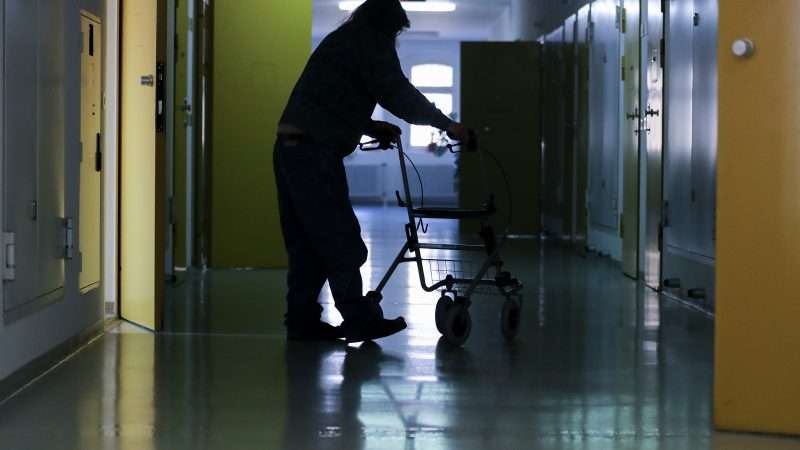
Federal prosecutors unsuccessfully tried to argue this week that an 80-year-old inmate serving a life sentence for marijuana offenses shouldn’t be released because COVID-19 is just “one more way to perish in prison.”
U.S. District Judge Donald Graham disagreed and ordered Atilano Dominguez, who was 27 years into his life sentence, to be released from federal prison on Tuesday, over the objections of the Miami U.S. Attorney’s Office and the Bureau of Prisons (BOP). The U.S. government opposed his petition for compassionate release on the grounds that Dominguez, who’s mostly confined to a wheelchair due to advanced arthritis in both knees, was a recidivism risk and that his life sentence was imposed with the knowledge that he could die of any number of illnesses in prison.
Dominguez was one of thousands of federal inmates who applied for compassionate release—a policy allows elderly and terminally ill inmates to go home ahead of schedule—in response to the COVID-19 pandemic. In late March, Attorney General William Barr directed the BOP to use compassionate release, home confinement, and other measures to get elderly and at-risk inmates out of federal prison. Despite the release of more than 7,000 thousand inmates, though, the rollout of Barr’s directive has been maddeningly inconsistent for inmates and families.
Dominguez was sentenced in 1994 to life in prison on two charges of conspiracy to possess with intent to distribute marijuana and possession with intent to distribute marijuana. His sentence was upgraded to a mandatory life sentence after prosecutors filed a draconian “three strikes” enhancement against him based on previous cocaine offenses. Graham wrote in his order releasing Dominguez that the judge at Dominguez’s original sentencing noted it was probably “too severe,” but there was nothing the judge could do because of the mandatory sentence.
Dominguez’ advanced age and long list of serious medical conditions—including diabetes, hypertension, and congestive heart failure—certainly fit the qualifying conditions for inmates at risk for COVID-19. But federal prosecutors said those were not “extraordinary and compelling reasons” to grant him relief, because he was expected to die in prison anyway.
“The government does not contest that the Defendant’s age and medical condition render him vulnerable to serious consequences if he were to contract the illness,” the Miami U.S. Attorney’s Office argued in a motion opposing Dominguez’s petition. “However, the Defendant’s sentence of life imprisonment always contemplated that the Defendant could perish in prison. The existence of one more way to perish in prison, specifically COVID-19 in addition to heart disease, cancer, stroke, aneurysms and myriad other ailments that afflict the aged, does not alter the appropriateness of the Defendant’s incarceration.”
Before 2018, that would have been the end of the line for Dominguez. There used to be no judicial review available for inmates applying for compassionate release, leaving inmates at the mercy of an arbitrary, inscrutable, and cruel prison bureaucracy. Justice Department records obtained by the criminal justice advocacy group FAMM in 2018 showed that at least 81 federal inmates had died since 2014 while waiting for the government to review their applications.
However, after the passage of the FIRST STEP Act in 2018, federal inmates can now take their pleas to a judge if the BOP rejects their applications.
Graham ruled in Dominguez’s favor, finding that “there is no authority that persons sentenced to life imprisonment are somehow precluded from being granted compassionate release or are subject to a higher standard of proof.” He was also not convinced by the argument that an 80-year-old quadruple bypass survivor with arthritic knees was a significant safety risk to the community.
For criminal justice groups, cases like this boil down to basic human decency. “Title 9 of the U.S. Attorney’s Manual governs criminal proceedings, and there is no provision there that requires you to be an asshole,” FAMM president Kevin Ring says.
Ring is not the only one. Earlier this year, a federal judge harshly rebuked the U.S. Attorney’s Office in San Francisco for pressuring defendants into plea deals that would waive their rights to compassionate release under the FIRST STEP Act, calling the practice “appalling cruel.”
Reason reported last year on the case of Steve Brittner, a former federal inmate who was diagnosed with metastatic brain cancer. Federal prosecutors opposed his compassionate release petition because they said his life expectancy exceeded his release date. In essence, Brittner wasn’t dying fast enough to qualify.
Then there’s Angela Beck, who suffered a year of potentially fatal medical neglect waiting for a breast cancer diagnosis and treatment. A federal judge granted Beck’s petition for compassionate release, finding that the neglect Beck suffered “likely reached the level of a constitutional violation,” and that if she remained in BOP custody she would face “a substantial likelihood of substandard medical care for her life-threatening disease.”
So far, there have been 124 federal inmate deaths and two BOP staff deaths due to COVID-19. The first inmate to die was a drug offender.
from Latest – Reason.com https://ift.tt/2EzptyL
via IFTTT


